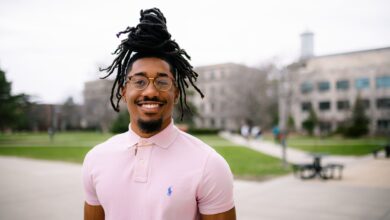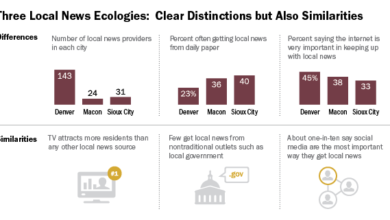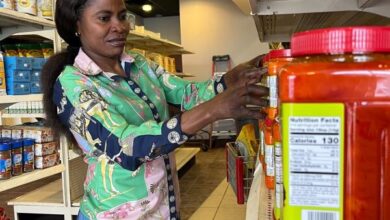Iowa City woman builds community, support for people of color

IOWA CITY — LaTasha DeLoach stood center stage before a podium earlier this month at the Iowa City Senior Center, scanning the crowd with a wide smile on her face. Her dress — a Ghanaian designer’s debut creation on American soil — trailed to the ground in ripples of vibrant orange and yellow flowers.
The room was filled with the 100-plus attendees she hosted, the vendors she paid, the speakers she invited. All had gathered for Iowa City’s inaugural Black History Ball — an event she had planned for months, all in the name of celebrating Iowa’s vibrant Black communities in style.
“We specifically wanted to make this a beautiful night and a beautiful opportunity for you all here,” DeLoach told her audience. “I’m just so proud.”
DeLoach, 42, is the coordinator of the Iowa City Senior Center, where she has worked for nearly six years to boost diversity initiatives through intentional programming and open discussions.
It’s the latest of her longtime efforts to build support systems for people of color in Iowa. Many of her pursuits intersected the night of the Black History Ball: The nonprofit she co-founded helped present the first-ever event. Her workplace hosted the event. And many of the attendees were part of the networks she has nurtured for people of color — a testament to her roles as a visionary and a community leader.
“The U.S. Surgeon General (has announced) an epidemic of loneliness and social isolation,” DeLoach said. “How do you cure it? Social connection. We’re trying to provide that for our community.”
Growing up Black
In 1991, DeLoach moved from Chicago to Dubuque, where her family was the only Black family in her elementary school. When she went to high school, she estimated she was one of about 10 Black students among her 1,600 peers.
When she moved to Iowa City in 1996, her mom asked her what school she wanted to go to. Her answer? The one with the most Black students.
At the time, that was City High School. Most recently, nearly 20 percent of the school’s enrolled students identified as Black in the 2022-23 school year, according to the National Center of Education Statistics.
“I wish that was seen as a badge of honor that we’re able to pass students of color” in the halls, DeLoach said. “That’s not always looked at as a positive thing in schools, unfortunately.”
She later graduated from the University of Iowa with a bachelor’s degree and then a master’s degree in social work.
After graduate school, she started working with 10 Black eighth-grade girls in North Liberty. She fostered conversations about their race and the experiences that come with it — both the joy and the pain.
Her support group, called G! World, was administered through Johnson County Social Services in partnership with the Neighborhood Centers of Johnson County. It morphed into an award-winning program that hundreds of middle and high school girls in over its 10 years of existence.
“A lot of my work around wanting to work with Black girls started from being a Black girl,” DeLoach said. “I know that hurt. I know that pain.”
Building community — again
DeLoach worked with young Black women for a decade, watching them grow into teenagers and then young adults. As they aged, though, DeLoach noticed something: The feelings of isolation from being a person of color in a predominantly white state didn’t go away.
“We see that a lot in people of color, particularly women, who feel isolated in spaces,” she said. “It’s usually described as this low-level depression because you feel like the resources and the people that you need to wrap around you” aren’t there.
DeLoach ran for the Iowa City Community School District’s school board and was elected in 2015. At the time, a Black woman hadn’t won an Iowa City school board seat in about three decades. DeLoach’s appointment marked the second time in history.
She felt alone as the only woman of color on the board. So, on a whim that December, she posted on Facebook an invitation to other women of color to meet up for dinner. She was expecting five — maybe six — people to come. Instead, 80 women showed up.
“I ended up having to call somebody like, ‘Uh, can you help me get some appetizers?’” DeLoach said with a laugh. “After that, other people wanted to give money to keep this thing going.”
She partnered with a co-worker to form the nonprofit Sankofa Outreach Connection, a volunteer and woman-run organization operating out of Iowa City. The word “sankofa” is from the Ghanaian Akan language, and it means to go back, look for and gain wisdom, power and hope.
The group embodies that mission by providing community and resources to women of color in Johnson County and beyond through mentoring networks, educational programs and bonding events. Group members recently gathered to create vision boards together, DeLoach told The Gazette. They’ve attended movies with predominantly Black casts, like the 2023 film “The Color Purple,” in the hundreds.
Most recently, they partnered with the Iowa City Senior Center’s Original Mature Groovers — another support group for people of color that DeLoach helped launch — for the inaugural Black History Ball.
As she stood at the podium at the event, DeLoach recognized many faces in the crowd: They belonged to the people whose lives she has touched through her work.
“The cure to social isolation is social connection. We’re providing medicine,” she said. “Nobody supports a Black woman like another Black woman.”
A more connected future
Due to health reasons, DeLoach resigned from her school board position in 2017. Even so, she’d like to believe her legacy lives on through the women of color — current and future — who become elected officials in the county.
“If I was just a part of helping, then I did what I was supposed to do for history,” she said. “Those women are carrying forth those torches and doing that work.”
Sankofa Outreach Connection has grown to more than 700 members. The group now opens its doors to any woman of color across Iowa, although most of its core lives in Iowa City, Coralville, North Liberty and Cedar Rapids.
During the organization’s eight years, DeLoach has witnessed amazing friendships form and new careers start. And she wants to continue the momentum: Sankofa Outreach Connection has applied for $23,000 from Iowa City’s Racial Equity and Social Justice Grant for a new project called EmpowerHER.
The program would focus on addressing Black maternal health disparities. In 2021, the national maternal mortality rate for Black mothers was 2.6 times that of white mothers, according to the National Center for Health Statistics.
EmpowerHER would include a partnership with UI Health Care providers to establish support groups and educational programs for mothers of color. It would also facilitate networking events and workshops to connect Sankofa Outreach Connection members with local businesses, organizations and entrepreneurs for professional opportunities.
“We’ve tried to create a gateway instead of gatekeeping, so that people could feel the dignity of being able to take care of themselves fully,” DeLoach said. “And not always feeling like they have to go to another city just to feel some sense of community, some sense of the joy in being among people who understand your culture.”
Brittney J. Miller is the Energy & Environment Reporter for The Gazette and a corps member with Report for America, a national service program that places journalists in local newsrooms to report on under-covered issues.
Comments: (319) 398-8370; brittney.miller@thegazette.com
























































